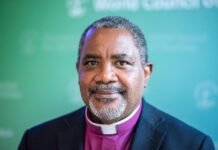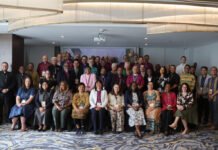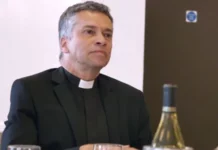Jan. 25, 2019
The Diocese of Toronto, the most prominent and populous of Canadian Anglican dioceses, issued a congratulatory news release on Dec. 28 announcing that a bishop of that diocese had been married in a same-sex ceremony at St. James’ Cathedral, with Bishop Susan Bell of the Diocese of Niagara officiating and Archbishop Colin Johnson and Bishop Andrew Asbil in attendance.
We realize that some may see this as a personal matter, but given the public nature of the event and those involved, we do feel we need to address these actions since our Church is presently engaged in a process of discernment regarding same-gender marriages. These are our brothers and sisters in Christ, and in raising questions about recent events, our aim is neither to accuse nor to question motives but to point out real and significant difficulties in the process of discernment in which our Church is engaged.
This event takes place in the context of a diocese whose bishop, then Archbishop Colin Johnson, following General Synod 2016, declared, along with several other diocesan bishops, that they would proceed with allowing same-sex marriages in spite of the fact that the Resolution regarding Canon XXI had not yet gone through second reading and a final vote on the matter. The pre-emptive nature of this action has raised questions for many about the integrity and meaningfulness of this legislative process, especially as no ecclesial censure was invoked.
Nevertheless, since 2016 many dioceses, parishes, and individuals across the Canadian Church have heeded the call to engage in deep and meaningful study and interaction with those with whom they disagree, hoping to both open themselves to the wisdom of Scripture and to hear fully those with whom they might never agree. Indeed, Primate Hiltz has called us to “good disagreement” in this matter and we understand that as a call to patience and respect during this process. In the best of cases, including, we understand, in the Diocese of Toronto, this listening and learning was done in a spirit of civility, charity, patience and grace–the purpose being discernment by the whole people of God.
This latest action taken in the Diocese of Toronto runs contrary to that spirit of restraint and of ongoing discernment. How are we to take seriously the urgings of our leaders to listen, to study, to pray and patiently to discern the leading of the Holy Spirit when, at least for some of the leadership in the Dioceses of Toronto and Niagara, the conversation seems to be over? In light of the pre-emptive actions of 2016, now underscored by this latest event, this process seems increasingly hollow.
With these concerns in mind but, more importantly, considering the clear voice of Scripture, and of our Anglican tradition, we continue to urge our Church not to change the Marriage Canon—a change that would set our official doctrine against our common revelation of Scripture, and thus compromise our place in the Anglican Communion and many of our ecumenical relationships. In addition, we do not wish to see compromised our Church’s ministry in communities that hold to the traditional teaching on Christian marriage. Let ours be a Church in which all are welcomed, regardless of sexual orientation or background, and in which we all are nurtured to grow in holiness and fidelity to Christ. We want to bring glory to Christ and to encourage his Church to greater faithfulness, harmony and love.




The Anglican Communion Alliance of Canada represents the conservative members of the Anglican Church of Canada.
Of course no censure was invoked. Any censure to be meted out will be invoked against the few remaining orthodox bishops. See the TEC model currently in use in Albany.
It is clear from the passive voice here that no one from the Anglican Communion Alliance brought any charges against anyone, so why would they expect that the revisionist leadership that is forcing gay marriage on the Anglican Church of Canada would bring charges against each other?
I am sorry, I am sure the Anglican Communion Alliance is made up of a group of very nice people, but the time for naivety on these matters is long past. The Anglican Church of Canada has been performing gay marriages openly, although not officially, since 2002- in what world do they expect the openly revisionist hierarchy to invoke Christian discipline on heretical bishops?
Hello. May I point out, when that gay bishop, (Robertson?) was consecrated as a type of assistant Bishop in the Toronto Diocese, a few clergy wrote letters of objection to Archbishop Colin Johnson. Now, Robertson’s consecration occured about two years ago. Archbishop Johnson did, I believe, publically acknowledge he had received letters objecting. But, he went ahead. My point is, conservative clergy are speaking up as best as they can. So, I am glad the Anglican Communion Alliance have written this statement. I don’t know who they sent the statement to. I doubt if our national newspaper would print it. And, while it is true some “same-sex marriages” have been occuring, it isn’t yet wide spread. But, the appearance of openly gay clergy is happening in quite a few dioceses. These gay clergy are prodiving a powerful political force in the Canadian Church, which means it is difficult to have neutral, objective discussions when the gay clergy are present. So, when gay clergy are present, and when the diocesan Bishop has a liberal theology, it is impossible for a traditional clergyperson to publically voice opinions.